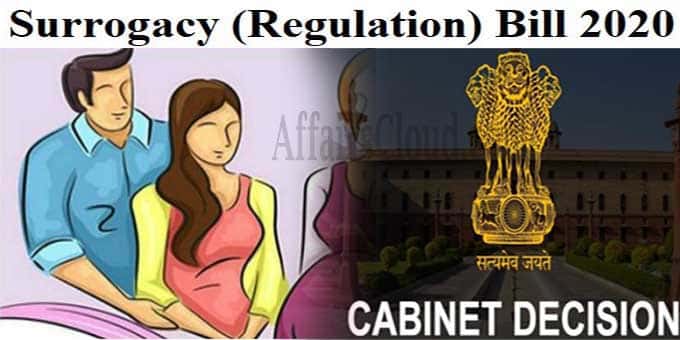The Cabinet Committee on Economic Affairs (CCEA) Chaired by the Prime Minister (PM) Shri Narendra Modi has approved the following proposals on February 26, 2020.The approval in detail are as follows: Cabinet approves Surrogacy (Regulation) Bill, 2020
Cabinet approves Surrogacy (Regulation) Bill, 2020
The Union Cabinet has approved the Surrogacy (Regulation) Bill, 2020. According to the proposed bill, any woman can become a surrogate mother by her own will. Apart from childless Indian couples, widows and divorced women will also get the benefit.
i.The draft of the new bill has included all the recommendations of the Select 23-member Committee of the Rajya Sabha headed by BJP( Bharatiya Janata Party) MP(Member of Parliament) Bhupender Yadav, which had studied the old drafts of the Surrogacy (Regulation) Bill, 2019 and suggested 15 major changes in the bill.
Special in the new bill:
- A surrogate mother need not be a close relative woman.
- A provision has been made to form the National Surrogacy Board at the center and the State Surrogacy Board in the states. These boards, to be created at different levels, will monitor the process of surrogacy. Competent officers will also be appointed for this in the states & Union Territories (UTs).
- The period of insurance cover for surrogate mother has been increased to 36 months. In the previous bill, the time of insurance cover was fixed at 16 months.
- There will be a ban on commercial surrogacy(which involves an agreement, which includes monetary compensation to the surrogate mother along with medical expenses associated with the pregnancy) and it has been recommended to allow altruistic surrogacy,which focuses on providing no monetary compensation to the surrogate mother.
- According to the new bill, no foreign person will be able to have children in India through surrogacy. Indian married couples, married couples of Indian origin living abroad and single Indian women will be able to take advantage of surrogacy under certain conditions. However in the case of single women, they will have to be widowed or divorced. Also, their age should be between 35 and 45 years.
- The panel also recommend to delete the definition of “infertility” as “the inability to conceive after 5 years of unprotected intercourse” on grounds that it was too long a period for a couple to wait for a child.
Cabinet approves the order to include 37 central laws in the concurrent list for implementation in the J&K Union Territory
The Union Cabinet has approved placing 37 Central laws in the concurrent list for the Union Territory (UT) of Jammu and Kashmir(J&K) under Section 96 of the Jammu and Kashmir Reorganisation Act, 2019.
Key Points:
i.The approval is an effort to ensure administrative effectiveness and smooth transition in J&K.
ii.Significantly, in August 2019, the Central Government had decided to abolish most of the provisions of Article 370 relating to special status of Jammu and Kashmir and divide it into two Union Territories (Jammu and Kashmir and Ladakh). Both these states came into existence from 31 October 2019. Prior to October 31, 2019, all central laws were in force in all states except Jammu and Kashmir, but after 31 October 2019, now all central laws have come into force here as well.
iii.Under Section 96 of the J&K Reorganization Act 2019, the Central Government has the right to amend the laws as necessary, adopting any law before the completion of a period of one year from the date fixed in the context of the UTs.
Cabinet approves the exemption of IPGL from the DPE Guidelines
The Union Cabinet gave its nod for the exemption of the India Ports Global Ltd (IPGL) from the Department of Public Enterprises (DPE) guidelines. This will help in the smooth execution of the Chabahar project in Iran. However, this does not include exemptions from reservation and vigilance policy and will continue to apply as before.
i.In order to develope & manage the Shahid Behesthi Port of Chabahar in Iran,the IPGL was formed as a special purpose vehicle(SPV) jointly promoted by Jawaharlal Nehru Port Trust (JNPT) and Deendayal Port Trust (DPT) under the control of the Ministry of Shipping .
ii.After the withdrawal of the US from the Joint Comprehensive Plan of Action (JCPOA) or Iran deal 2015, the Ministry of External Affairs advised the Ministry of Shipping to remove the JNPT and DPT on 29 October 2018 to avoid the impact of the US sanctions. On the basis of this suggestion and with the approval of the high-level steering committee, all the shares of JNPT & DPT were transferred on December 17, 2018 to Sagarmala Development Company Ltd. (SDCL).
iii.Chabahar port is the India’s 1st port project which is strategically important. In such a situation, the IPGL board of directors should continue to work as a management company. Also, following the directions of the foreign ministries along with the ship transportation, the guidelines of the DPE should not apply to it for 5 years. Accordingly, the Ministry of Shipping had requested IPGL to be exempted from the DPE guidelines so that the project could be implemented smoothly.
Cabinet approves National technical textiles mission costing Rs 1,480 crore
The Union Cabinet has approved the National Technical Textiles Mission. It will cost Rs 1,480 crore. The objective of this mission is to lead India in the manufacture of technical fabrics used in specific fields like medical, military.
i.Finance Minister Nirmala Sitharaman proposed the formation of the National Technical Textiles Mission in the budget presented on February 1,2020. It is to be executed during 2020-21 to 2023-24.
ii.The mission has 4 Components namely, Research, Innovation and Development with outlay of Rs. 1000 Crore, Promotion and Market Development, Export Promotion and Education, Training, Skill Development.
iii.Technical textiles use such materials and products so that they can be used in the relevant field according to the need. This type of clothing is used in agriculture, medicine, sports, military and many other fields.
iv.According to a survey, the size of technical clothing market in the country in 2017-18 was estimated to be Rs 1,16,217 crore. With the current trend of growth and various initiatives of the government, the market size of technical garments is estimated to reach Rs 2 lakh crore in 2020-21.
Cabinet approves a bill to confer National importance status for 2 food institutes in Haryana & Tamil Nadu
The Union Cabinet has approved a bill to give the status of Institute of National Importance (INI) to 2 National Institutes of Food Technology at Kundli, Haryana and Thanjavur,Tamil Nadu(TN).
i.The cabinet amended National Institutes of Food Technology, Entrepreneurship & Management (NIFTEM) Bill, 2019 to give status of national importance to the 2 food institutions.
ii.This step will help these institutions to cooperate with foreign food institutes and improve the standard of education.
Cabinet okays amendments to give occupancy rights to Scheduled tribes of Lakshadweep
The cabinet has approved amendment of the Laccadive, Minicoy and Amindivi Islands Land Revenue and Tenancy Regulation, 1965 to confer occupancy rights to the Scheduled Tribe (ST) population in the union territory (UT) of Lakshadweep.
i.The Lakshadweep island has large number of ST population and they did not have occupancy rights so far.This move by the Government will give them occupancy rights.
About Lakshadweep UT:
Capital– Kavaratti
Formation– 1 November 1956
Administrator– Dineshwar Sharma
About J&K(Union Territory):
Capitals– Jammu (Winter), Srinagar (Summer)
Lieutenant Governor– Girish Chandra Murmu
Lakes– Dal Lake , Wular lake, Gangabal Lake, Nigeen Lake





